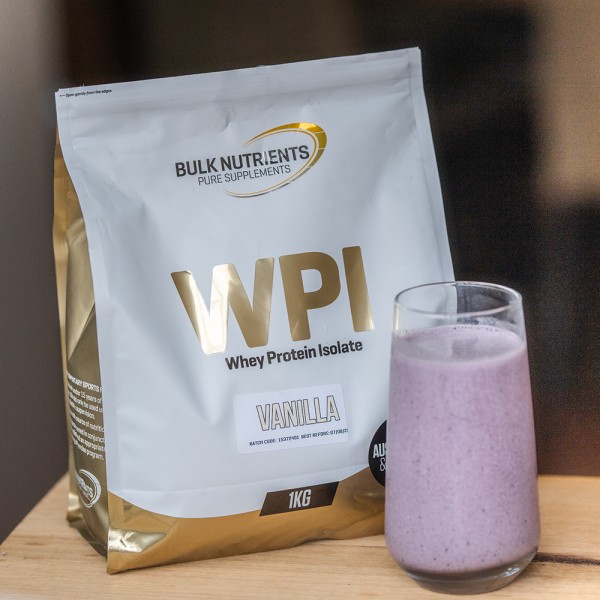
How to Travel With Powders Under New Australian Restrictions
Posted by Ryan Bevan
Estimated reading time: 3 minutes

Whey protein is a type of protein supplement made from a byproduct of cows’ milk.
It’s found its way into diets of those who take their nutrition, training and recovery seriously.
Whether you’re building muscle, losing weight or needing to recover rapidly from a hard workout, protein is your weapon of choice.
So, why is whey protein taken? The short answer: for its scientifically backed properties.
It’s the most nutritionally complete protein, packed with all the amino acids you need (we’ll touch on these later) and it’s excellent value for money.
When you’re training hard, you want to recover well and see the results of your work, and whey protein is one of the best ways to maximise your effort in the gym.
Whey protein repairs and protects lean muscle, making it a critical component of anyone’s fitness goals.

We often get asked, ‘what is whey protein made from?’ and the answer is cows’ milk. Whole cows’ milk is made up of about 20% whey protein and 80% casein protein.
Whey separates from whole milk during the production process of different dairy products, such as butter, cheese and yoghurt.
When cheese or yoghurt is made, cheese wrights or yoghurt producers want the thicker part of the milk – the curds. The leftover, lighter liquid is the whey.
After its beneficial properties were discovered, rather than discarding the whey protein liquid, it was then turned into a powder. From the cheese-making process, approximately 10 litres of whey is produced from 1kg of cheese.
Both of these dairy proteins contain all of the amino acids your body needs, but whey protein is more quickly digested by the body, which is exactly what you need after a hard workout. The protein then goes on to promote recovery and muscle growth.
Amino acids are organic compounds that form the building blocks of protein.
Our bodies naturally form some amino acids through organs like our liver, pancreas and kidneys, but there are several amino acids our bodies require, but do not produce. These proteins can be found in food or supplements like whey protein.
What’s incredible about whey protein is its biological value which is so high our bodies absorb more amino acids and nutrients from it than other protein sources. This makes it our body’s preferred protein source of choice.
The amino acids you’ll find in whey protein are:
If you’re new to whey protein, you may be wondering, “what is whey protein good for?”, and an abundance of studies have found it’s a powerful supplement to achieve a range of goals.
But before we go into the science of what whey protein does, there are plenty of conventional reasons that make whey protein the preferred choice when taking protein supplements.

Simply put, whey protein powder is:
So now, let’s dive into the science behind what whey protein is and what whey protein does.
If you’re serious about your nutrition, then you’ll already know that protein is essential for your muscle health and muscle synthesis.
What whey protein does is help you build and maintain your muscle mass, helping prevent muscle atrophy.
Put simply, protein is vital for anyone who is looking to increase their muscle size through resistance and weight training.
But not just any protein, protein that is high in the amino acid Leucine.
A 2017 study found protein containing an abundance of this amino acid is integral to muscle synthesis… and that’s where whey protein comes in.
Whey protein is high in Leucine, making it a powerful protein supplement to take, especially for those who prefer to exercise in the evening or night time as our bodies would usually be absent of protein overnight while they slept.
Generally when we sleep, our body doesn’t have access to protein. While this may not have any impact on some people, it will impact the results of people who train at night.
Whey protein supports your body’s ability to recover during sleep.
What whey protein does when you take it after an evening exercise is provide your body with a high-quality protein as you sleep, allowing it to increase muscle strength and hypertrophy.
What’s fascinating about whey protein is that its beneficial effects extend up to 72 after exercise. These effects include improvements to peak aerobic power, strength, and it even helps with muscle reconditioning.
To achieve these results, you must train and consume whey protein on a regular basis.
In short, whey protein is what you need to recover faster so you can work out again, maintaining the high quality of your workouts and making the most of your time in the gym.
As explained by Mike Roussel PhD of the Meta Shred Diet, while whey protein supports muscle growth, it won’t build muscle on its own. You’ll still need to put the hard yards in the gym, backyard or wherever you workout, to build muscle.
What the amino acid Leucine in whey protein dies is “turn on” muscle building in cells, which essentially helps you gain muscle, but it will not build muscle for you.
It’s a reminder that you need to be eating more calories than you’re burning with your workouts and consuming enough protein.
Dr Roussell recommends 2 grams of protein for every kilogram of body weight.
Alongside building muscle mass, whey protein is also a powerful weight loss tool.
According to Marie Spano M.S, a US-sports nutritionist who works with the Atlanta Hawks in the NBA, the Braves in the Major League Baseball, and the Falcons in the NFL, consuming enough high-quality protein allows your body to lose weight without minimising muscle tissue. This allows you to preserve your muscle gains while shredding weight.
Whey protein is a nutritionally complete protein source, making it one of the best protein sources you can take for muscle mass and weight loss.
And, what whey protein does is also increases the release of leptin, the hormone that satiates your appetite, helping you achieve that calorie deficit.
One of the quickest and easiest ways to enjoy your protein powder of choice is mixed with water in a shaker, but you can also think beyond the drink.
Foods like yoghurt, porridge or cereal act as great vehicles for protein powder and will give a protein-packed boost to your food. Remember to add water as needed to help mix it into the foods.
There are two types of whey protein available, and they are whey protein isolate and whey protein concentrate.
You may be wondering, “What is the difference between whey protein isolate and concentrate?” and that’s a great question.
While both types of protein are made from whey, and are taken for the same (or similar) benefits and properties, what makes them different is how they’ve been processed and refined.
Whey Protein Isolate is more refined, and therefore contains less lactose, sugars and carbohydrates, while Whey Protein Concentrate usually takes the cake as the best value-for-money protein supplement.
To learn more, you can explore the differences between Whey Protein Isolate and Concentrate in further detail in our informative article, Whey Protein Isolate vs Concentrate.
Whey protein is a safe supplement that, when taken in moderation, has no side effects.
However, as with many types of supplements and even some types of foods, overconsuming whey protein may lead to a few mild side effects.
The side effects of whey protein include:
It is recommended to stay within serving guidelines to enjoy all of the benefits without any side effects.
From the science lab to the sports field, most experts are supportive of whey as a nutritionally complete protein source.
Whey protein is high in a range of amino acids that support our body functions, and due to its high biological value, it outperforms other proteins on the market.
From enhancing muscle growth and maintenance to supporting healthy weight loss, whey protein is an unmatched protein source.

Ben Crowley, founder of Australia's top sports supplement brand, Bulk Nutrients, combines two decades of industry experience with a commitment to employee work-life balance and career growth.
A firm believer in quality, Ben founded Bulk Nutrients to provide affordable, high-quality products, even amid global challenges.
Apart from business, he enjoys family time, outdoor activities, and adrenaline-charged car projects.
With over 700 recipes and articles, the Bulk Nutrients Blog has something for everyone! Find a new workout, meet our ambassadors or take a deep dive into our products today.
We're an Australian manufacturer and supplier of high quality sports supplements.
Operating since 2008, Bulk Nutrients has become one of the premier Australian brands to supply nutritional products to top level athletes, competitors and those on a journey to a healthier lifestyle.
One thing that sets Bulk Nutrients apart is that we love to talk to our customers!
Whether you need product advice, help with the website or need a change made to your order... call us on +61 3 6266 4725.
If you prefer email you can email us day or night at info@bulknutrients.com.au
For online chat, hit the 'Chat' button in the bottom right hand corner of your screen and you'll be connected to one of our lovely customer service team.
Or if you'd like to get in touch through our online contact form, that's cool too!
Terms & ConditionsSustainability StrategyPrivacy PolicyPayment InformationSitemap
All prices are in Australian dollars (AUD) and include GST unless otherwise stated.
All content copyright © Bulk Nutrients 2008 - 2024